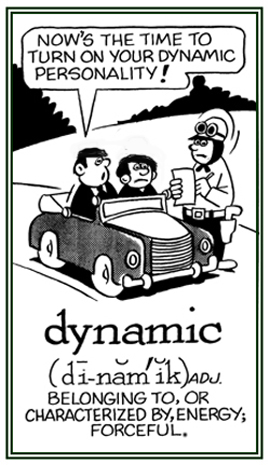-ic
(Greek: a suffix; pertaining to; of the nature of, like; in chemistry, it denotes a higher valence of the element than is expressed by -ous)
dipsogenic
Producing or inducing thirst.
dolorific (adjective), more dolorific, most dolorific
Relating to or causing pain or grief: The plane crash brought on dolorific anxiety, worry, and tension among the relatives waiting for their families to arrived at the airport.
dolorogenic (adjective), more dolorogenic, most dolorogenic
1. Pertaining to pain; dolorific: While cooking the meal in the kitchen, Jill suddenly had a dolorogenic perception on her hand which caused her much discomfort and suffering..
2. Regarding the cause or quality of pain or grief: The death of her father created or aroused a dolorogenic heart in Lynn's breast for a very long time.
2. Regarding the cause or quality of pain or grief: The death of her father created or aroused a dolorogenic heart in Lynn's breast for a very long time.
domestic (adjective), more domestic, most domestic
1. Relating to or used in the home or everyday life within a household: Every weekend Jane had to do domestic chores in her condo, like vacuuming, dusting, and doing the laundry.
2. Concerning or involving the family or people living together within a household: The newspapers were full of articles about sensational domestic violence taking place in some homes in the city.
3. In agriculture, referring to an animal kept on a farm or as a pet: The domestic cows on Sam's farm were kept in the barn during the winter months.
4. Descriptive of something produced, distributed, sold, or occurring within a country: The German couple thought that the domestic wine grown in southern Germany tasted very good, so they bought a few bottles of it at the local store.
5. Pertaining to the internal affairs of a nation or country: The president made a speech which included information about the country's domestic concepts or affairs, like the need for restrictions for owning weapons.
6. Pertaining to a tendency to remain or stay at home: The couple enjoyed their domestice life at home with their young children and decided to have vacation on their balcony and in their garden.
7. Etymology: from Middle French domestique, from Latin domesticus, "belonging to the household"; from domus, "house".
2. Concerning or involving the family or people living together within a household: The newspapers were full of articles about sensational domestic violence taking place in some homes in the city.
3. In agriculture, referring to an animal kept on a farm or as a pet: The domestic cows on Sam's farm were kept in the barn during the winter months.
4. Descriptive of something produced, distributed, sold, or occurring within a country: The German couple thought that the domestic wine grown in southern Germany tasted very good, so they bought a few bottles of it at the local store.
5. Pertaining to the internal affairs of a nation or country: The president made a speech which included information about the country's domestic concepts or affairs, like the need for restrictions for owning weapons.
6. Pertaining to a tendency to remain or stay at home: The couple enjoyed their domestice life at home with their young children and decided to have vacation on their balcony and in their garden.
7. Etymology: from Middle French domestique, from Latin domesticus, "belonging to the household"; from domus, "house".
dualistic
dulcigenic
dynamic (adjective), more dynamic, most dynamic
1. Relating to a person who has great enthusiasm with a lot of energy and determination: Thomas, the new boy in class, seemed to be so dynamic with new ideas and so full of pep and vitality that everyone was interested in knowing him.
2. Pertaining to a sense of purpose and the ability to getting things going and accomplished: Joan’s mother had a dynamic character as a single mom in that she had to manage and to coordinate all of the activities of her family in a successful way.
3. Characterized by vigorous activity and producing or undergoing necessary changes and developments: Henry was a dynamic student who was an athlete and also dedicated to being a scholar by learning his academic assignments.
4. A reference to the involvement of strength and vitality that produce motion or activities: In comparison to a small town, a large city is quite dynamic because there is more traffic on the streets day and night and more things happening and taking place with so many people of different nationalities.

© ALL rights are reserved.

© ALL rights are reserved.
Go to this Word A Day Revisited Index
2. Pertaining to a sense of purpose and the ability to getting things going and accomplished: Joan’s mother had a dynamic character as a single mom in that she had to manage and to coordinate all of the activities of her family in a successful way.
3. Characterized by vigorous activity and producing or undergoing necessary changes and developments: Henry was a dynamic student who was an athlete and also dedicated to being a scholar by learning his academic assignments.
4. A reference to the involvement of strength and vitality that produce motion or activities: In comparison to a small town, a large city is quite dynamic because there is more traffic on the streets day and night and more things happening and taking place with so many people of different nationalities.


Go to this Word A Day Revisited Index
so you can see more of Mickey Bach's cartoons.
dynastic
dysgenic
Relating to, or causing the biological impairment or deterioration of a strain or race; especially of humans.
dyslectic
1. Referring to a condition in which an individual with normal vision is unable to interpret written language.
2. Relating to difficulty in reading resulting from defects in the brain; specifically, word blindness.
2. Relating to difficulty in reading resulting from defects in the brain; specifically, word blindness.
dyspeptic (adjective), more dyspeptic, most dyspeptic
1. Affected with or referring to painful digestion.
2. Someone who is afflicted with indigestion.
3. Irritable, cross, gloomy, or negative: "The father took a dyspeptic view of Jimmy's musical career."
2. Someone who is afflicted with indigestion.
3. Irritable, cross, gloomy, or negative: "The father took a dyspeptic view of Jimmy's musical career."
dysphagic
Referring to the inability to swallow or having difficulty in swallowing.
dystonic
Referring to dystonia or hypertonicity or hypotonicity of tissues.
dystrophic
In ecology, it is used to describe a pond or lake containing water that is brown in color, abnormally acidic, and lacking in oxygen.
Such water is unable to support much plant or animal life because of the amount of humus dissolved in it.
1. Someone with a strange or an odd personality.
2. Anyone who deviates markedly from what is considered normal; especially, a person of odd or unconventional behavior.
2. Anyone who deviates markedly from what is considered normal; especially, a person of odd or unconventional behavior.


